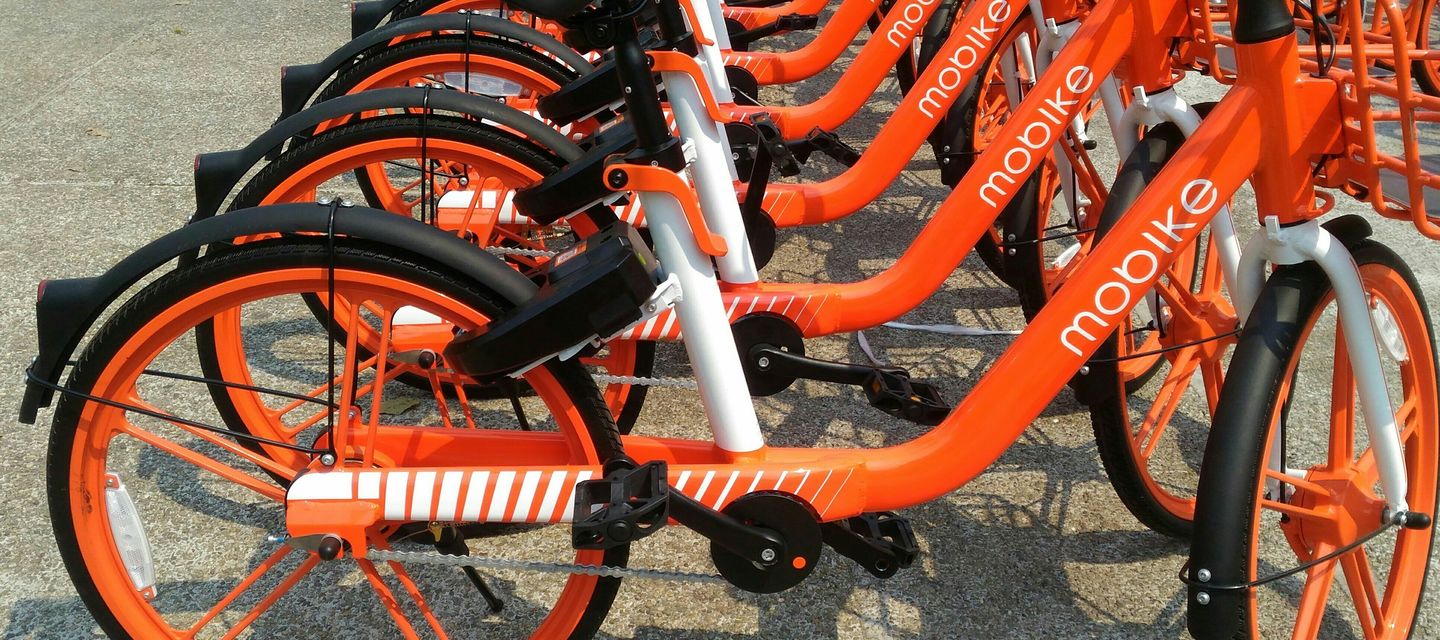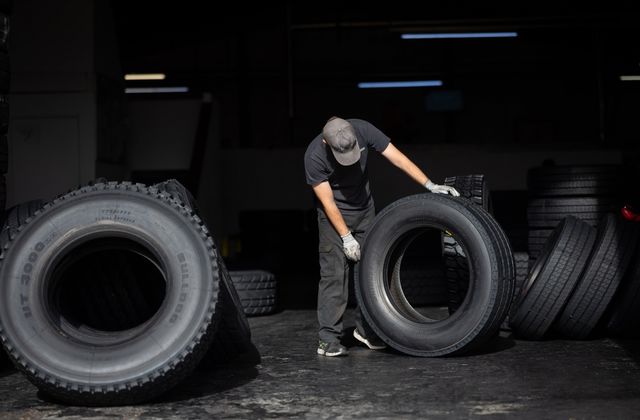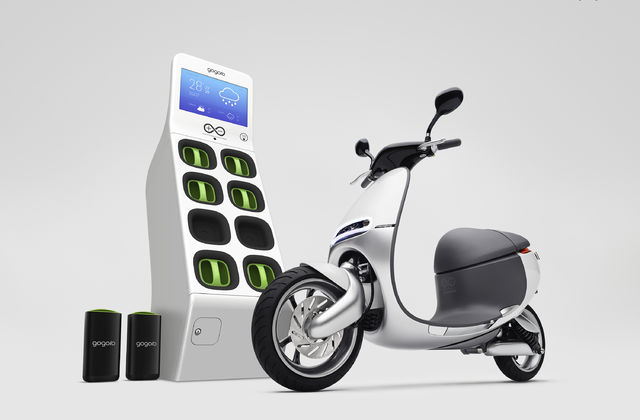What is it? Mobike offers a shared bike mobility service to fulfil short urban trips. It is supported by smart technologies (GPS, IoT, telecommunication module) with each bike equipped with a GPS chip for convenient pick-up and drop-off (Mobike, 2018a).
Why is this important? The current urban mobility system faces numerous challenges. The existing urban infrastructure can no longer support the rapid and continued expansion of vehicles on the road. This problem is worsened with the growing urban population, particularly in emerging countries. Urban mobility also has various environmental externalities with motor vehicles contributing to carbon emissions and congestions (Ye, 2018). A more sustainable alternative is needed to tackle these urban mobility challenges.
Main resource strategy: Slowing the loop by providing mobility as a service that leads to longer product lifetime
Other resource strategies: Regenerating the loop through mobility solutions that lead to better air quality; regeneration of urban ecosystems; battery powered by solar energy
Closing the loop through bike design with lifecycle perspective in mind that maximises recycling capabilities, design for durability; recycling and reutilisation of damaged bikes
Business model aspects: Customers can access Mobike’s bike-sharing platform with a small deposit and are charged by ride time. The Mobike app provides the location to the nearby bikes which can be dropped off anywhere after use.
- Value Proposition: Budget-friendly, convenient shared bike mobility service for urban dwellers that helps to decarbonise the urban mobility system (Ellen MacArthur Foundation, 2020).
- Value Creation & Delivery: In terms of pricing, it is competitive with existing bike-sharing platforms. For example, in Delft, the Netherlands, Mobike charges €0.50 per half hour or € 4.90 per month; compared to Swapfiet’s €15 (Tongeren, 2018).
- Value Capture: Pricing schemes are pay-per-use or monthly. Dominant revenue comes from Mobike’s large user base (Wu and Xue, 2017).
Business model experimentation practices: Mobike was first launched in Shanghai in April 2016 with 100,000 station-less bikes aimed at the (at the time) lack of short-distance transportation solutions in the city (Wu and Xue, 2017). Mobike worked closely with the local government of Shanghai to adapt to the city’s regulations and compete with existing bike-sharing platforms. To comply with designated parking areas in the city, Mobike has developed a reward program that offers credits to users when they park in these areas (Wu and Xue, 2017). Credit points are also offered for reporting of damaged bikes.
In July 2018, Mobike has announced its New Growth Initiatives which includes the Mobike Life Cycle program to reduce, reuse and recycle bike components; E-bike development (Mobike Global, 2018)
Sustainability outcomes: As of December 2017, Mobike users have collectively bicycled over 18.2 billion kilometers, which is equivalent to 4.4 million tonnes of CO2 avoided worldwide (Mobike, 2018b).
Sources:
Ellen MacArthur Foundation (2020). Mobike. Accessed 20 November 2020 at: https://www.ellenmacarthurfoundation.org/case-studies/bike-sharing-in-china
Mobike (2018a) ABOUT US. Accessed 7 December 2020 at: https://mobike.com/global/about
Mobike (2018b) How Cycling Changes Cities. Accessed 20 November 2020 at: https://mobike.com/global/public/HowCyclingChangesCitiesMobike.pdf
Mobike Global (2018) RECYCLING, REFUNDING AND REDESIGNING: Unveiling Mobike’s New Growth Initiatives. Accessed 20 November 2020 at: https://mobike.com/global/blog/post/growth-initiatives
Tongeren, R., (2018). New kind of shared bike in Delft. Delta-Journalistic platform TU Delft. Accessed 20 November 2020 at: https://www.delta.tudelft.nl/article/nieuw-soort-deelfiets-delft#:~:text=Vijftig cent per half uur,€15 voor niet-studenten.&text=Klinkt ideaal%2C zo’n Mobike
Wang, M.Q. and Harvey, H.,(2015). Chinese transport: achievements and challenges of transport policies. Mitigation and Adaptation Strategies for Global Change. 20. 623-626. https://doi.org/10.1007/s11027-015-9647-y
Wu, F., & Xue, Y., (2017). Innovations of bike sharing industry in China : A case study of Mobike’s station-less bike sharing system (Dissertation). Accessed 20 November 2020 at: http://urn.kb.se/resolve?urn=urn:nbn:se:kth:diva-209402
Ye, F., (2018). Reducing China’s Urban Air Pollution with Transport Solutions at Beijing Workshop. [online] World Resource Institute. Accessed 20 November 2020 at: https://wrirosscities.org/news/reducing-china’s-urban-air-pollution-transport-solutions-beijing-workshop#:~:text=A key contributor to harmful,transport emissions reduction in Beijing
***
About project Circular X
Project Circular X is about ‘Experimentation with Circular Service Business Models’. It is an ambitious research project funded by the European Research Council (ERC) which supports top researchers from anywhere in the world. Project CIRCULAR X runs from 2020-2025. The project is led by Principal Investigator (PI) Prof Dr Nancy Bocken, who is joined by a multidisciplinary team of researchers at Maastricht Sustainability Institute (MSI), Maastricht School of Business and Economics, Maastricht University. The project cooperates with businesses who want to innovate towards the circular economy.
Project Circular X addresses a new and urgent issue: experimentation with circular service business models (CSBMs). Examples of such new business models include companies shifting from selling products to selling services and introducing lifelong warrantees to extend product lifetimes. However, CSBMs are far from mainstream and research focused on experimentation is little understood. The research aims to conduct interdisciplinary research with 4 objectives:
- Advancing understanding of CSBMs; their emergence and impacts
- Advancing knowledge on CSBM experimentation
- Developing CSBM experimentation tools
- Designing and deploying CSBM experimentation labs
Funding source
This project has received funding from the European Research Council (ERC) under the European Union’s Horizon 2020 research and innovation programme, grant agreement No. 850159.
Using this information
When you cite this publication, please use the following source:
Circular X. (2020) Case study: Mobike - Shared bike service. Accessed from www.circularx.eu



